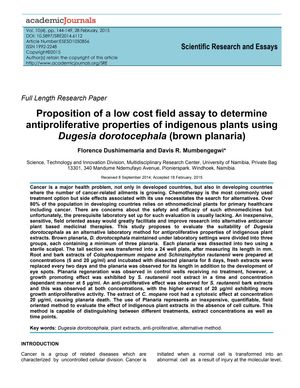Proposition of a Low-Cost Field Assay to Determine Antiproliferative Properties of Indigenous Plants Using Dugesia Dorotocephala (Brown Planaria)
February 2015
in “
Scientific Research and Essays
”

TLDR The study showed that brown planaria can be used to cheaply test if local plants can stop cell growth.
The study demonstrated that Dugesia dorotocephala (brown planaria) can be used as a cost-effective model to assess the antiproliferative properties of indigenous plant extracts. It found that the root extract of Colophospermum mopane was cytotoxic at a concentration of 20 µg/ml, while Schinziophyton rautanenii root extract promoted growth at 5 µg/ml and its bark extract had antiproliferative effects at both tested concentrations. The planaria model proved to be a versatile tool for distinguishing between growth-promoting and inhibitory effects of plant extracts. The authors concluded that this assay is a valuable preliminary screening method for antiproliferative agents in environments without access to cell culture or small mammal testing facilities. Further research was suggested to confirm the findings, and the study was supported by the University of Namibia and funded by the University of Namibia Research and Publications Office and DAAD.

